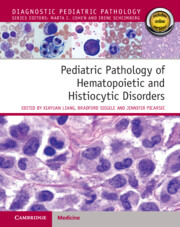Book contents
- Pediatric Pathology of Hematopoietic and Histiocytic Disorders
- Pediatric Pathology of Hematopoietic and Histiocytic Disorders
- Copyright page
- Epigraph
- Contents
- Contributors
- Section I General Hematology and Hematopathology
- Section II Non-Neoplastic Hematologic Disorders of Blood and Bone Marrow
- Section III Non-Neoplastic Disorders of Extramedullary Lymphoid Tissues
- Chapter 7 Non-Infectious Lymphadenopathy
- Chapter 8 Infectious Lymphadenopathy
- Section IV Neoplastic Disorders of Bone Marrow
- Section V Mature Lymphoid Neoplasms
- Section VI Histiocytic Disorders and Neoplasms
- Index
- References
Chapter 8 - Infectious Lymphadenopathy
from Section III - Non-Neoplastic Disorders of Extramedullary Lymphoid Tissues
Published online by Cambridge University Press: 25 January 2024
- Pediatric Pathology of Hematopoietic and Histiocytic Disorders
- Pediatric Pathology of Hematopoietic and Histiocytic Disorders
- Copyright page
- Epigraph
- Contents
- Contributors
- Section I General Hematology and Hematopathology
- Section II Non-Neoplastic Hematologic Disorders of Blood and Bone Marrow
- Section III Non-Neoplastic Disorders of Extramedullary Lymphoid Tissues
- Chapter 7 Non-Infectious Lymphadenopathy
- Chapter 8 Infectious Lymphadenopathy
- Section IV Neoplastic Disorders of Bone Marrow
- Section V Mature Lymphoid Neoplasms
- Section VI Histiocytic Disorders and Neoplasms
- Index
- References
Summary
Enlarged lymph nodes are frequently encountered in children and often are transient. Persistently enlarged lymph nodes require biopsy and microscopic examination to classify the type of disease process. Lymphadenopathies are often characterized based on which lymph node compartment (paracortex, follicles, or medullary sinuses) is affected [1]. Thus, histologic evaluation of node architecture is paramount to determine the nature of the lymphadenopathy. In a large series of studies in children, approximately one-third showed evidence of infectious disease [2].
Lymphadenitis (lymphadenopathy due to infectious causes) is roughly characterized based on the type of microorganisms (bacteria, virus, fungus, etc.). Although many of these entities have well-described morphologic characteristics, others demonstrate a morphologic continuum with characteristics that overlap with one another, thus making the diagnosis based solely on morphologic grounds challenging. In the following discussion, the most common entities will be highlighted, recognizing that less common diseases do enter the differential of childhood lymphadenitis.
- Type
- Chapter
- Information
- Publisher: Cambridge University PressPrint publication year: 2024

